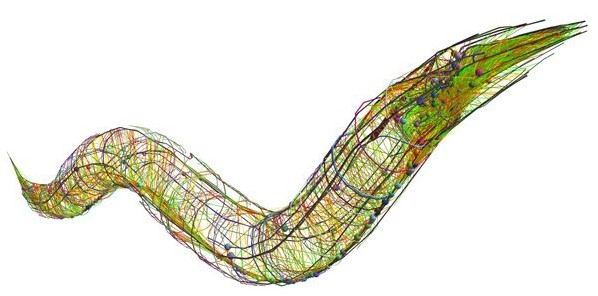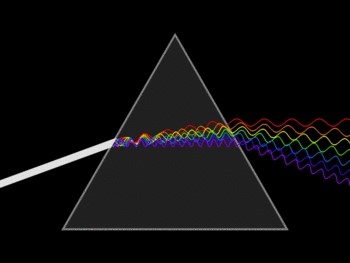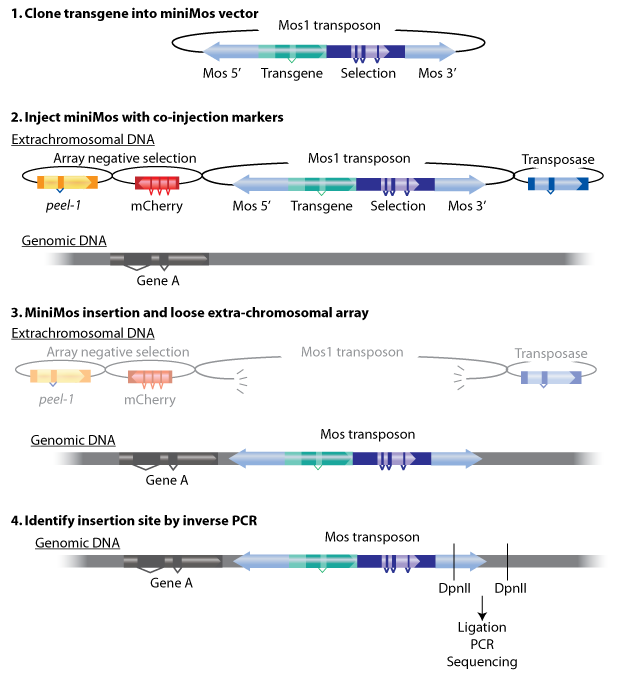Design
Project
Contents
Overview
Why Caenorhabditis elegans?
Caenorhabditis elegans, a classic model organism, is widely used in scientific researches. In our project, we also choose it because its whole genome has been sequenced, and it has its own connectome(neuronal ‘wiring diagram’) completed by 2012 [1][2]. Adault C.elegans is about 1mm in length, 45μm in width and it is easily to observe and manipulate under stereomicroscope[3][4]. What's more, C.elegans has fixed ‘genetically determined number of cells’[5].These characteristics are of great help to accomplish our project.
Compared with other model organisms like Mus musculus, which needs approximately two to three months to mature, C.elegans possesses shorter life span. A self-fertilizing hermaphrodite can maintain its genetic information and live for two to three weeks[6]. Meanwhile, worms can also propagate sexually to get genetic recombination offsprings.
Why AWM AWM neuron?
Normally, the formation of a new ability is coordinate with the specific environment signal, so in our project we need the specific stimulus to train worms form new abilities. We hope to localize the target neurons directly by stimulus in C.elegans for the demand of accuracy and efficiency. Different behaviors of worms are controlled by different neurons, and due to their sensitivity to odors, many behaviors, such as attraction, avoidance, feeding, or mating, can be induced by different chemicals.
In our project, we choose the olfactory neurons ( AWA &AWB) to accomplish our design. The attractive odorant diacetyl is normally sensed by the AWA olfactory neurons. The repulsive odorant 2-nonanone is detected by the AWB olfactory neurons. With the expression of CoChR and Chrimson(photosensitive proteins) in these neurons, worms can develop attractive and repulsive responses to blue light and red light, so we can use lights to induce their learning behaviors.
Skinner Box
Skinner Box, invented by Burrhus Frederic Skinner(1904—1990), is a laboratory apparatus used to study animal behaviors. It uncloses the secret of the operant behavior and deeply influenced American education at that time. Skinner divided the behaviors into two types: respondent behavior which induced by some known stimulus like Pavlov's dog, and operant behavior caused by a subject itself like Skinner's pigeon. In our life, most behaviors or reflects are operant behaviors and operant reflects, so it’s very important to study the mechanism of Skinner box. It is a shell chamber that is large enough to easily accommodate the animal. (Commonly used model animals include rodents—usually lab rats-pigeons, and primates). An operant conditioning chamber permits experimenters to study behavior conditioning (training) by teaching a subject animal to perform certain actions (like pressing a lever) in response to specific stimuli, such as a light or sound signal.[7][8]
There are several manipulandums in the box, which can automatically detect the occurrence of a behavioral response or action. Typical operands for primates and rats are response levers; if the animal presses the lever, the opposite end moves and closes a switch that is monitored by a computer or other programmed devices. When the lever is pressed, food, water, or some other type of reinforcements (a consequence that will strengthen an organism's future behavior whenever that behavior is preceded by a specific antecedent stimulus.) might be dispensed. In some instances, the floor of the chamber may be electrified. The rats learn to press the lever through several training periods because of awards or punishments. [9]
In our project, we train the transgenic C. elegans and control their behaviors by lights. Expression of two channelrhodopsins in the olfactory receptor neuron pair provides worms with the preference or aversion to specific wavelengths, and the corresponding lights are employed to reinforce their addictive or abstemious attitude to alcohol. Those reflects or behaviors are all operant behaviors and operant reflects which can be helpful for a more deep studies concerning nerves and behaviors.
Optogenetics
Optogenetics is a method which uses lights to control cells in living tissue, typically neurons, which have been genetically modified to express light-sensitive ion channels like channelrhodopsin, halorhodopsin, and archaerhodopsin. Optogenetics provides millisecond-scale temporal precision which allows us to attain a quick shift between positive and negative reinforcement(a consequence that will strengthen an organism's future behavior). Employing lights as the input signals instead of chemical signals, optogenetics is leading a methods revolution across all fields of science and engineering("Method of the year",2010, Nature Methods)[10]
Optogenetics can stimulate and monitor the activities of individual neurons within freely-moving animals and precisely measure their response in real-time. In our project, it makes it possible to train worms, observe their behaviors and quantify the neuronal signals. In traditional training experiments, the simulation (input) is always has an inevitable residue, from hours to days. Besides, the readouts(output) are not in the same pace with the optical control. However, by using our optical device(see hardware-link), these issues can be solved greatly.
Why microfluidics?
Microfluidics is a powerful technology that can integrate a number of functions in a tiny plate, which is well matched with the size of C.elegans. Scientists have successfully achieved high-through imaging and screening of worm populations with this technology[11]Inspired by this, we design two microfluidic chips to study the development of learning behaviors of C.elegans by observing their phisical responses at the population level and measuring the signal of individual neuron after optical stimulations.
Despite the fact that worms are confined in chips and pushed by the fluid, the channels are specially designed to effectively simulate their normal movements. PDMS, the material of the chips, is transparent and has no influence on the quantification of light signals in optogenetics experiment. Gas molecules, diacetyl and 2-nonanone, can diffuse in PDMS so that worms can sense the odor of such molecule. As a result, we can observe their preference to these odors.
About light
In our design, we use a group of optogenetic proteins and optical devices. Channelrhodopsins protein CoChR and Chrimson are coupled with dual-Color fluorescence protein GEM-GECO and expressed in the pair of neurons AWA and AWB. This combination is used to lower the cross-talk and to get clearer image during experiments. Excited by blue light and red light separately, CoChR or Chrimson can induce the change of calcium ion concentrations inside the nerve cells. Then it can cause the blue-shift of fluorescences of GEM-GECO. To enhance preciseness, we modified the projector and design our own software of microscope. New filters are installed in the device so that we can simultaneously control the intensity and period of light when stimulating the individual C. elegans during manipulation.
Why is the platform important?
Along with the development of neuroscience, more and more techniques have been used to study the behavior psychology. However, the original platform of the behavior psychology research, Skinner box, is not suitable for modern researches because its “black-box” model cannot reveal the changes in the organisms during the process of their learning new ability. Meanwhile, the former research of learning ability based on C.elegans were more focused on chemical signals. These can demonstrate the existence of the learning behaviors but seems untenable, since the residues of the stimuli are hard to erase. Thus, if we aim to study the learning ability associated with neuroscience and behavior psychology, we need to develop a new platform which allowss us to explore the internal mechanism. Compared to the traditional methods, light stimulation is more easily to control and more reliable for the following data analysis.
That is why our project is so important.
It employs the optogenetics and neuroimaging to record the change in each neuron during the formation of new ability, so we can know what happened exactly inside the brain. Moreover, the application of microfluidics in our platform allows us to combine the process among ability-training and neuron-activating, and makes the research becoming easier to carry out.
In the future, our platform can also be applied in different fields, such as the simulation of the Brain-Computer Interface (BCI). The BCI can help the paralysis patients obtain the ability to move and operate things. But the signals from the human brain is too complex and difficult to deal with. If we can decipher the neuronal signals during learning progress when the patient’s mind interacting with the computer, it is possible to simplify the network and build more connections between them.
We are now using our platform to study the alcoholism by trainning worms to be addicted with alcohol and then study the neuron networks during the formation of this behavior. Hope one day we can figure out the logic networks of alcoholism and help to treat more serious social problem.
What is MiniMos?
The miniMos transposon is used to carry transgenes into the C. elegansgenome by the means of inserting a transgene into a modified Mos1 element (miniMos). The miniMos transposon can carry the inserted transgene (together with a selection marker) into the genome where insertions are generated directly by injecting worms. It will take approximately 1 week to get the result. The insertion site is random and can be identified by inverse PCR on the strain.
The miniMos system contains 4 vectors——transposon with target gene, transposase, mcherry and peer-1 markers. Transposon needs transposase to cut and paste in the genome. mcherry and peer-1 are two negative selecter that can help to select the target strains.
The method has some advantages: 1)The insertion frequency and fidelity is high. 2)The exact insertion site can be determined. 3)Large transgenes can be inserted. 4)The miniMos element is active in C. elegans. 5)Transgenes are expressed in the germline at high frequency.
How to get the worms?
As a classic model organism, C. elegans has many advantages.It is one of the simplest organisms with a nervous system. Research has explored the neural and molecular mechanisms that control several behaviors of C. elegans, including chemotaxis, thermotaxis, mechanotransduction, learning, memory, and mating behaviour. Therefore, C. elegans is a suitable model organism which we can easily manipulate and observe. In our program, we aim to change the physical behaviour of C. elegans by using the two specific optogenetic traits. Through microinjection and selection, we are able to get two strains with two phenotypes of the preference to blue light and the aversion to red light, and the next step is to obtain the single worm with the combination of these 2 different traits.
To achive our objectives, we choose a mating method, because it is less time-consuming and easier to operate than microinjecting the other array to the existed strain.
In general, mating is the pairing of either opposite-sex or hermaphroditic organisms. However, for C. elegans, mating can hybridize two different traits on the next generation by the paring of the hermaphrodite and the male. Besides, one of the greatest advantages of C. elegans is that it can either autocopulation or hybridization, which means that after hybridization, the hermaphrodite can self-fertilize and guarantee to produce a large number of offsprings with identical genetic characteristics.
Here is the mating procedures: Mating procedures: 1.Heat shock to get males(30℃,8h). 2.Parents mating to get the first filial hybrid generation(female : male = 3 : 4). 3.Single out each hermaphrodite in a small plate. 4.Test the fluorescence of F1. 5.Single out F1 and self-fertilizing to get F2. 6.Test the fluorescence of F2.
References
- ↑ [1]Caenorhabditis elegans(WIKIPEDIA). Retrieved September 25, 2017 https://en.wikipedia.org/wiki/Caenorhabditis_elegans
- ↑ [2]Brenner, S., Draft, A. N. C., Chklovskii, D., System, F. F. N., Brain, T. M., & Seung, S., et al. . The connectome debate: is mapping the mind of a worm worth it?. Scientific American
- ↑ [1]Caenorhabditis elegans(WIKIPEDIA). Retrieved September 25, 2017 https://en.wikipedia.org/wiki/Caenorhabditis_elegans
- ↑ [3]Chen, Y., Scarcelli, V., & Legouis, R. (2017). Approaches for studying autophagy in caenorhabditis elegans. Cells 6(3)
- ↑ [1]Caenorhabditis elegans(WIKIPEDIA). Retrieved September 25, 2017 https://en.wikipedia.org/wiki/Caenorhabditis_elegans
- ↑ [4]Uno, M., & Nishida, E. (2016). Lifespan-regulating genes in c. elegans. , 2, 16010.
- ↑ [1]R.Carlson, Neil (2009). Psychology-the science of behavior. U.S: Pearson Education Canada; 4th edition. p. 207. ISBN 978-0-205-64524-4.
- ↑ [2]Krebs, John R.(1983). "Animal behaviour: From Skinner box to the field". Nature. 304 (5922): 117. Bibcode:1983Natur.304..117K. PMID 6866102. doi:10.1038/304117a0
- ↑ Brembs, Björn. "Operant conditioning in invertebrates". Current Opinion in Neurobiology. 13 (6): 710–717. doi:10.1016/j.conb.2003.10.002
- ↑ [1] Editorial, N. (2011). Method of the year 2010. Nature Methods.
- ↑ [1] Chung, K., et al. (2008). ”Automated on-chip rapid microscopy, phenotyping and sorting of C. elegans.” Nature Methods 5(7): 637-643.
References




